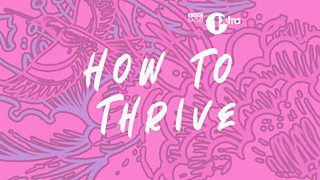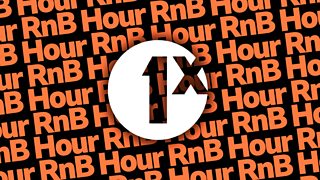βThe more I check my bank balance, the less anxious I feelβ β Five tips for how to avoid money problems

How to Thrive is a new 1Xtra Chat podcast all about mental health, mindfulness and wellbeing, hosted by Meggan Roxanne of .
Episode one looked at a subject affecting everyone’s mental health, for better or worse: Money.
What’s in our bank account can have an immense impact on our mood, so how can we stay on top of our finances, and why can social media have an adverse effect on our relationship with money? Meggan was joined by budgeting gurus and , plus Dr Seem, a GP specialising in mental health and wellness, to discuss their relationships with money. Here’s what we learned:
Subscribe to How To Thrive
-
![]()
Get a new episode every week
A deep dive into wellbeing, mental health and mindfulness. Intimate conversations offering enlightenment, support and clarity from the voices of phenomenal people and industry experts
More 1Xtra podcasts
-
![]()
1Xtra Talks β the podcast with frank conversations about real life issues
Subscribe on ³ΙΘΛΏμΚΦ Sounds
Information and Support β Debt
Note: The ³ΙΘΛΏμΚΦ is not responsible for the contents of any other sites listed
1. Control of your money starts at a young age
From the moment we get our very first payslip, we’re given greater financial control. After that, we’re offered the choice to wildly spend money or carefully save it up.

It sounds simple, but Toni Tone argued that financial literacy should be taught in schools. We need to know more before we’re given such big responsibility.
Knowledge about debt, budgeting and credit ratings are “the skills we need in the real world,” she says. And most of us grow up without having in-depth knowledge of credit cards or mortgages, or even why saving could be beneficial in the long run.
Toni ended up teaching herself. Take some time out and learn what APR means. Find out the difference between cards. Learn the value of getting a good credit score. “Google was my best friend,” she says.
Meggan agrees, saying she wish she'd learned more about tax rates when setting up her own business. She had to learn the hard way, "which was so scary."
2. Thinking differently about saving could help you save more
Saving can feel like a slog. When you get a payslip, immediately spending most of it on rent can leave little incentive to put more away in a savings account. But Toni argues that we could save more if we change how we think about it:
Paying yourself is a form of self careToni Tone
“Paying yourself is a form of self care,” she says. For every bit of money you’re putting away, you’re basically giving yourself a bonus for all the hard work you put in.
She regrets going on shopping splurges, saying she wish she’d saved more at the time. “When I used to have my massive shopping hauls, my parents would be like: ‘You already own five pairs of jeans just like that!’ And I was so convinced that I did. Capitalism makes us feel like we need things. I don’t own any of those items now. I wish I’d never bought them.”
3. Avoid comparing yourself to others on social media and IRL
If you feel like you don’t have your finances in check, and you can’t afford holidays, a car, or to spend extra money on expensive brands, the last thing you want to see is friends on social media splashing the cash. The same applies to celebrities with seemingly endless disposable income.

To avoid jealousy or feeling hard done by, Meggan suggests changing your social media feed and unfollowing people who live lavish lifestyles.
“You find yourself comparing [to other people]. That’s where money has impacted my mental health – following the wrong people and living vicariously through them.”
Plus there's every chance your feed doesn't tell the whole story. These people might be spending big on new clothes, but they could also be up to their knees in credit card deals.
To borrow a famous saying, comparison is the thief of joy – so clean your feeds to avoid comparing.
4. Check your bank balance, but not obsessively
Staying on top of finances is easier said than done, but you can’t conquer a money problem if you pretend it doesn’t exist in the first place.
That’s the advice of Bola Sol, who says checking your bank balance every day will give you a better grasp of where funds keep disappearing to, and which things you could live without – takeaways, taxi journeys, etc.
Acceptance is the first step to change, says Bola. “The more I check my bank balance, the less anxious I feel.”
5. Donβt forget to enjoy yourself
You could become the ultimate saver, counting every penny from each potential purchase. Or you could save in steps, and treat yourself when you’ve managed to raise £100 or more.
"Itβs great to be frugal, but not to the point where youβre not enjoying your life"Toni
Despite all of the above being a great way to avoid money stress, Toni says you mustn’t forget to treat yourself. Save up enough for a holiday and give yourself more experiences, rather than spending big on new clothes and food.
“It’s great to be frugal, but not to the point where you’re not enjoying your life.”
While it's great to put away as much as possible, don't avoid social situations or feel like you're punishing yourself.
More from 1Xtra
-
![]()
The standout moments from Krept & Konan's in-depth conversation with DJ Target
They talk Cadet, 'Revenge is Sweet' and Ed Sheeran.
-
![]()
Subscribe to the 1Xtra Talks podcast
Reece Parkinson joins weekly guests to have honest, frank and real conversations about your life and your issues.
-
![]()
Listen to 1Xtra's RnB Hour mix
The freshest RnB cuts peppered with serious classics under the expert guidance of 1Xtra



